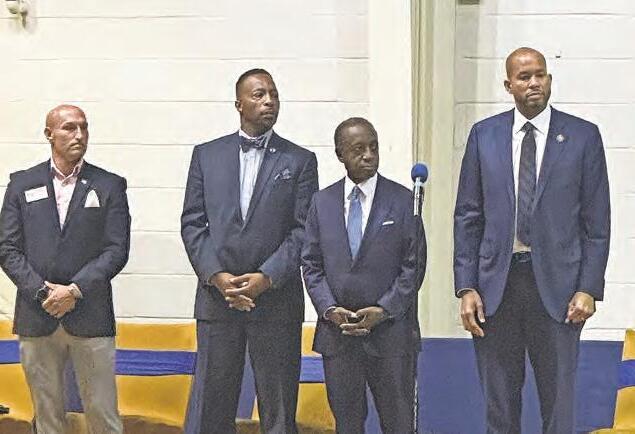
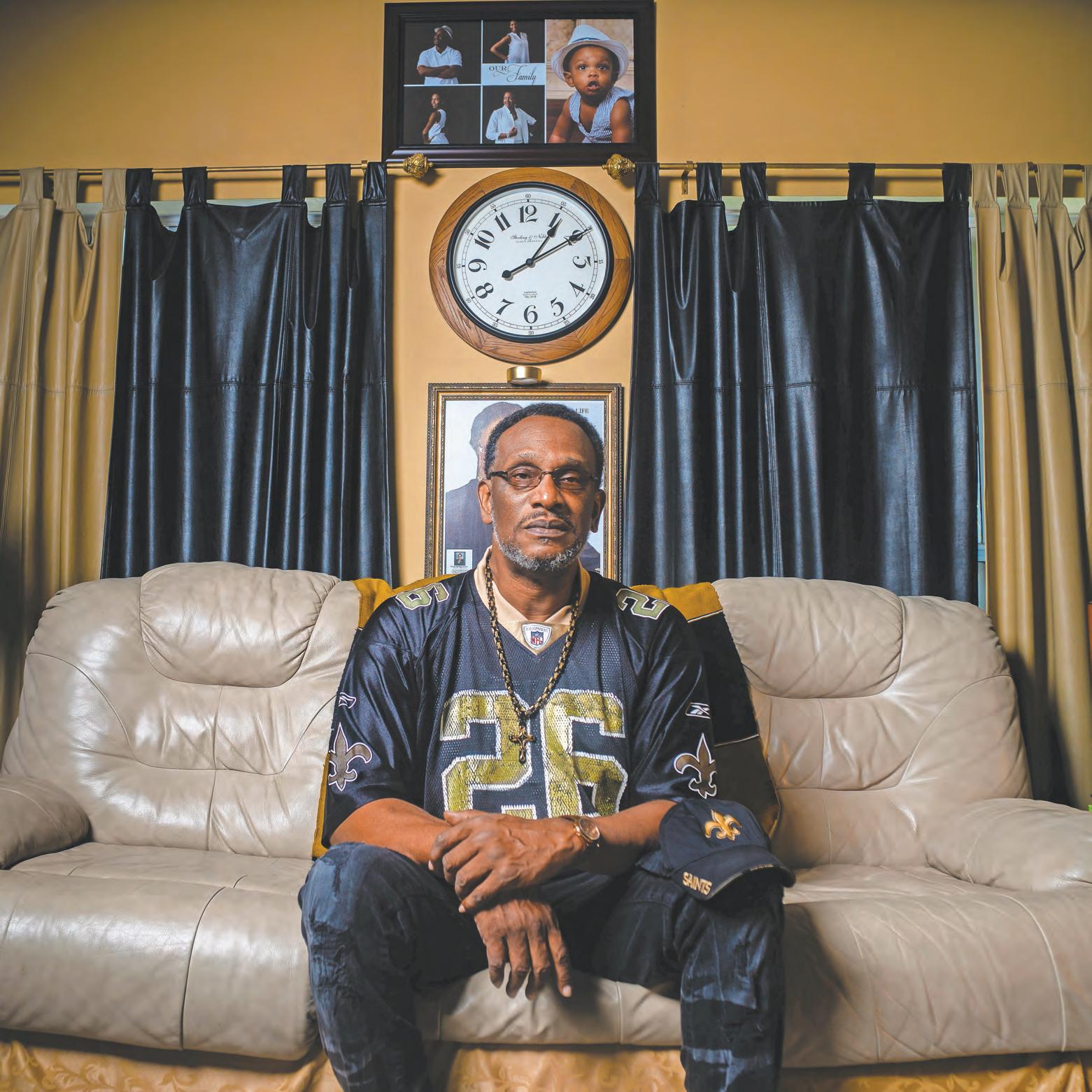



By TABIUS MCCOy
Monday, August 29, 2005, at 6:10 a.m. marked the start of a moment that would be forever etched in history.
Category 3 Hurricane Katrina had just made landfall on New Orleans, and the city would never be the same. Its aftereffects wiped out more than 80 percent of the city’s infrastructure.
The same streets where children played and brass bands once marched were unrecognizable, submerged in water. Homes, history, and culture vanished, erasing the soul of the predominantly Black city, similar to that of Oscarville. In parts of the city, water climbed 18 feet high, taking more than 1,300 lives.
Millions across the region learned through television, word of mouth, or firsthand experience that the homes and safe havens they once knew were gone. An estimated 1.2 million people evacuated from New Orleans during Katrina.
Among the cities people fled to, Atlanta was high on the list. Its historical Black presence and southern culture made it a natural choice for many New Orleans natives. Nearly two decades later, many of these natives still call Atlanta home. However, the path that brought them here is unique to each person.
“The pictures can give you some sense, but being there is actually different,” said Cheryl Corley, an NPR reporter who covered the aftermath of Katrina in September 2005. “I don’t know if I could compare that to anything I’ve gone through—tornadoes and the destruction of tornadoes, other floods, and even much smaller floods. But this was eerie because you saw all of this destruction all over the place, and there was just a lack of people.”
Months after Katrina, many people from New Orleans went without governmental support. “It took a while for all of those things to happen,” said Corley.
In remembrance of the 20 years since Hurricane Katrina made landfall, The Atlanta Voice sat down with New Orleanians who made Atlanta a home away from home.
Troy Lewis, Age During Katrina: 35, 9th Ward
A Saints hat on his head, a Saints t-shirt on his back, black pants on his legs, and a pair of sneakers on his feet. That was Troy Lewis’ attire when he arrived in Atlanta in 2005.
“Of course, you all in Atlanta gave me a warm welcome,” laughed Lewis, reflecting on how he was suited head to toe in the gear of the Atlanta Falcons’ arch rival.
Despite the light-heartedness he shows
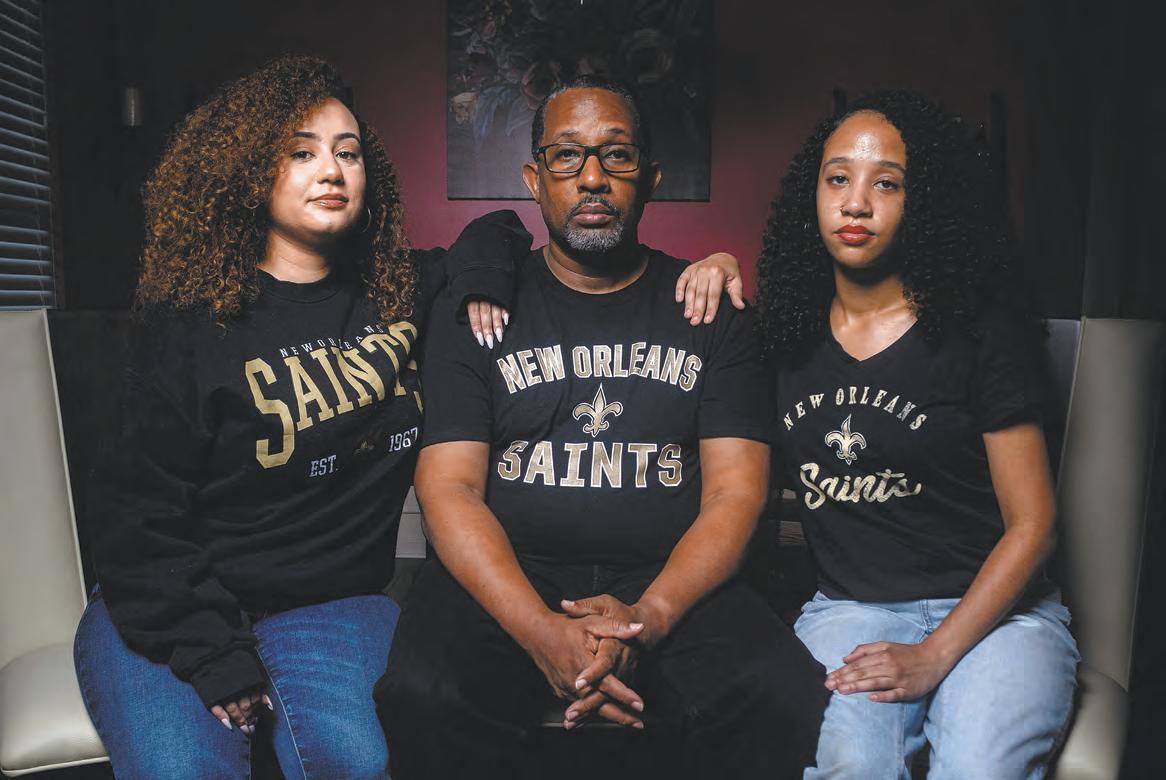
today, the reality is that the Saints gear on his back was the only possession he had when he got to Atlanta. At the time, evacuees like Lewis were often referred to as “refugees,” a term that felt heavy for someone still in his own country.
Lewis initially didn’t take Katrina seriously. He had grown up in New Orleans, and hurricane warnings seemed like a regular occurrence.
“We were going to try to stick it out because a lot of times hurricanes don’t hit New Orleans too hard,” he said.
But as he watched his older next-door neighbors evacuate, he grew more cautious.
“They were leaving, and they normally don’t leave, so I figured we should get out of here.”
Lewis gathered his wife and two daughters, ages eight and six, and the four of them made their way west toward Metro Atlanta to stay with his wife’s friend.
In the days that followed, Lewis watched Katrina unfold in his hometown.
“It’s not like today, so communication was not easy,” he said. “We went a good little while, maybe a couple of weeks, not really knowing where most of our family was.”
The more news and footage he saw, the
more he realized he would be in Atlanta for a while.
“It was like sixteen of us living in a three-bedroom house,” he said, as his family relied on neighbors and community donations to make ends meet.
When he returned to his home in St. Bernard Parish in October 2005, it was clear that everything had changed.
“This looked like the end of the world,” Lewis said, reflecting on his drive through New Orleans and St. Bernard. “You could see the gray flood lines at the top of houses where the water had risen.”
With banks shut down and all of his possessions, clothes, vehicles, and keepsakes lost, Lewis realized he would be rebuilding his life from scratch.
“If you ever felt the feeling of being homeless, that’s what it felt like,” he said.
Two decades later, Lewis still calls metro Atlanta home.
“I love it here… can’t get me out of here now,” he laughed.
After Katrina the Duncan family all evacuated from New Orleans coming to Atlanta.
“The strangest thing happened. It was like days before it came, it got quiet out there, like everything just—you see, no birds flying around, no chirping or nothing. It’s like they knew,” said Eddie Duncan with a tremor in his voice as he recalls the days leading up to Katrina.
Eddie had a decision to make. Watching television and seeing various news outlets warn residents of New Orleans to evacuate, he began to realize this storm wasn’t like any other he had experienced in his 35 years living in New Orleans. But for Eddie and his family of five, he felt like he would be left with no choice but to stay.
“We were almost going to stay because the transportation that we had wasn’t that reliable,” said Eddie. This would leave him, his three children all under the age of ten, and his wife to tough through the toll Katrina was bound to take.
At the last minute, his mother called and told him to take her car, as she had evacuated days earlier. Taking her car, Eddie and his family made their way to Jackson, Mississippi. Initially, he thought they would be gone for just a couple of days.
By DONNELL SUGGS
The annual Georgia Chamber Congressional Luncheon took place at the Columbus Convention & Trade Center on Wednesday morning.
Along with local dignitaries, statewide elected officials, and business leaders, the crowd included representatives from local Chambers of Commerce, including from Brunswick-Golden Isles, Albany, Warner Robins, Macon, Harris County, and the greater Pooler area, which represents Chatham County.
Shan Cooper, the founder and CEO of Journey Forward Strategies LLC, was awarded the first Blanchard Servant Leader Award during the luncheon. The award is named after former Synovus CEO James Blanchard, who took the stage to hand Cooper the award.
After leaving the stage, Cooper told The Atlanta Voice that Blanchard was a mentor and an inspiration to her. While on stage, she said she was doing flips inside because she was so proud to receive the first Blanchard Servant Leadership award.
“I’m humbled, grateful, it’s really kind of hard to believe,” Cooper said. “Jimmy taught me what it means to be a servant leader.”
Cooper said there were a lot of people who helped her achieve so much during her career as the former vice president and general manager at Lockheed Martin and chief transformation officer at Westrock.
“I hope I continue to make them proud,” she said.
Other Black leaders of industry and politics were in the room to see Cooper receive the award. Long time Congressman Sanford Bishop, a mainstay in Columbus-area Democratic politics, addressed the crowd before Cooper took the stage, and the first Black woman to hold a leadership role at Columbus Airport was there too.
“I need to be here so folks can hear from educated, qualified, Black voices,” said Columbus Airport Commission Vice Chair Delois Dee Marsh. “I deserve to be here.”
Marsh, a real estate broker and United States Army veteran, is active within the Columbus community.
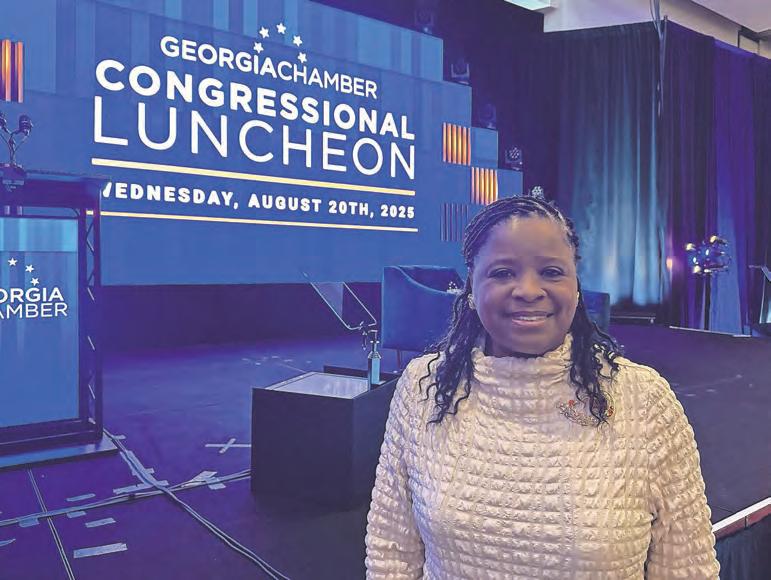
By ISAIAH SINGLETON
The Metropolitan Atlanta Rapid Transit Authority (MARTA) Police Department (MPD) held a press conference to discuss safety and security on the transit system and provide behind the scenes tours of its Real-Time Crime Center (RTCC) and Emergency Operations Center (EOC) at Chamblee rail station.
During the press conference, MARTA Police Department Chief of Police Scott Kreher aimed to dispel misconceptions about MARTA’s safety, emphasizing its status as one of the safest transit systems in the U.S.
“Hundreds of MARTA police officers patrol rail stations, trains, buses, and parking lots 24-hours a day, cracking down on nuisance behavior, acting swiftly during emergencies, and responding immediately when someone breaks the law on or near the transit system,” Kreher said. “The MARTA Police Department stands ready to protect our customers, the system, and the communities we serve every day.”
Year-to-date crime has decreased significantly: aggravated assaults by 24%, robberies by 18%, and overall crime by 8%, according to Kreher. MARTA employs over 300 officers and utilizes various security measures, including partnerships with the FBI, US Marshals, and TSA, according to Kreher.
He also said the system has suspended over 3,500 people for minor rule violations and issued 224 permanent bans.

“We wanted to dispel any comments made out in the public recently about MARTA not being safe or having a public safety plan, specifically around large events, and that is definitely farthest from the truth,” he said. “We work every day to prepare for events and remain solely committed to the safety of the system.”
Also, with three decades of law enforcement background, Kreher said he’s seen safety used as a political talking point to perpetuate unsafety over the fact MARTA is safe. He says
MARTA is one of the safest transit systems in the country and doesn’t work in a vacuum.
“We service four counties within the many cities and communities, and crime and public safety in those areas has a direct impact on the water system, saying that year to date, we’ve seen dramatic decreases in crime, especially violent crime,” he said.
He also says if people truly don’t feel safe, MARTA police “have more work to do” and “the reality of crime and perception of crime is always a battle”.
“We’re working very hard to ensure people’s safety, especially during larger events and crowds,” he said.
Additionally, he says they rely heavily on their technology and system of wide network cameras and portable solar cameras. These methods allow the MARTA police department to have an eye on the system monitored by real time crime center officers.
The focus also remains on enhancing public perception and safety, especially for major events like the World Cup.
“We partner with TSA, our neighboring jurisdiction and we do what’s called Tabletop exercises where we go through various scenarios,” he said. “We will continue to have that partnership into the upcoming Labor Day weekend, the World Cup, and more.”
Furthermore, Kreher says he wants the public to understand and know the perception of crime sometimes misconstrued with people who are unhoused, have mental health challenges, or substance abuse.
“While we don’t condone bad behavior, we want the public to understand being unhoused isn’t a crime, however it is an inconvenience to the riders,” he said. “We’re constantly working with our team of licensed clinicians to help these individuals to get resources.”
Upcoming improvements in September include new fare gates and payment systems to combat fare evasion.
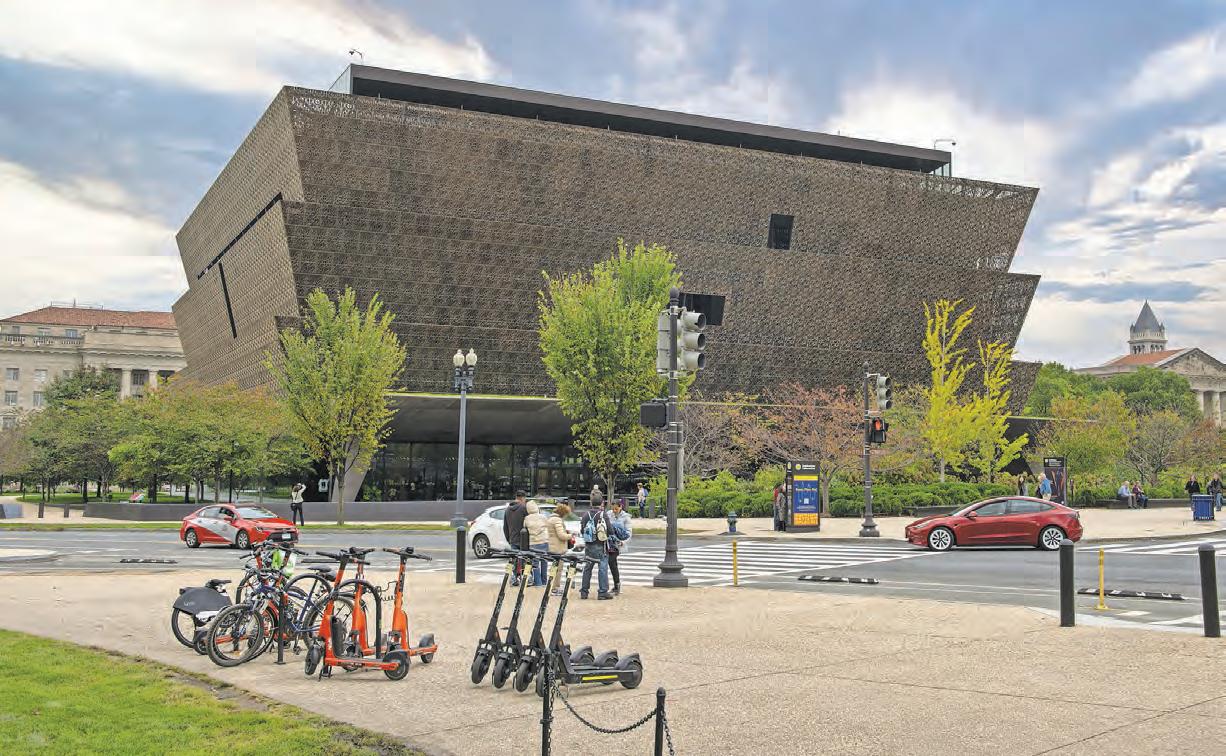
By FRANCES “TONI” DRAPER
America cannot afford to whitewash its past. Yet that is exactly what is at stake in the current review of the National Museum of African American History and Culture. To question whether slavery and racism belong in the story of this nation is not only dangerous — it is racist and, quite frankly, ridiculous.
The Smithsonian Institution’s internal review of its museums and exhibitions, prompted by a March executive order, has been described by the White House as a “constructive and collaborative effort” rooted in respect for the Institution’s mission. But let’s be honest about what this really is: an attempt to sanitize history. When politicians decide which stories can be told, truth becomes the first casualty.
The National Museum of African American History and Culture (NMAAHC) has, since its opening in 2016, drawn millions of visitors from across the United States and around the world. It is the only national museum dedicated solely to preserving and telling the African American story, which means it preserves the American story itself. Its exhibits are not decorative displays; they are America’s receipts — proof of what was bought, built, and broken on the backs of enslaved people.
Just as the Holocaust is remembered in all its brutality, so must America reckon with the truth of chattel slavery, Jim Crow, and racial terror. Anything less is historical erasure, a rewriting of facts to make the nation appear more palatable. But history is not meant to comfort — it is meant to confront. And only in confrontation do we find the lessons that lead us forward.
The National Museum of African American History and Culture (NMAHC) does not exist to make visitors comfortable. It exists to tell the full story of this nation — its horrors and its triumphs. The shackles, the slave cabins, the lynching photographs are hard to look at, yes, but they are necessary. They remind us of what was endured, resisted, and overcome. Are we really prepared to tell our children a fairy tale instead of the truth?
As someone whose own family lived through that history, I know that the story of Black America is one of both pain and perseverance. It is also a story of triumph: of building families, businesses, churches, schools, and newspapers in the face of unrelenting barriers. To erase the “ugly parts” is to erase the context that makes our resilience so extraordinary.
America’s Mirror
We dishonor our ancestors when we pretend that slavery was anything less than a foundational atrocity. We insult the present when we allow political
whims to dictate which truths are deemed “acceptable.” And we jeopardize the future when we deprive generations to come of the lessons that only honest history can teach.
This is why NMAHC matters. Located on the National Mall in Washington, D.C., it is not just a building — it is a mirror held up to America. Every exhibit, every artifact, every story says: this happened, and it shaped who we are. Visitors leave with a deeper understanding not just of Black history, but of American history, and of the ongoing struggle to build a more just society. That is precisely why efforts to weaken or censor its work are so dangerous.
So, what must we do? We must stand with NMAHC, yes — but also more. We must defend the truth against erasure, preserve history by sharing it with our children and grandchildren, and support the mission by becoming members and advocates. Encourage school trips. Take a neighbor. Contribute what you can. Institutions like this cannot thrive without a community of supporters who recognize their value and refuse to let them be diminished.
The truth of America’s story is not negotiable. It is not subject to political whim. It must be told fully, courageously, and without compromise — because history told truthfully is the only kind that heals. Erase the truth, and you erase America itself.
Frances “Toni” Draper is the publisher of the AFRO-American Newspaper (the AFRO), with offices in Baltimore, Maryland, and Washington, D.C.
FOUNDED
May 11, 1966
FOUNDER/EDITOR
Ed Clayton
Immortalis Memoria
PUBLISHER/EDITOR
J. Lowell Ware
Immortalis Memoria
The Atlanta Voice honors the life of J. Lowell Ware.
PUBLISHER
Janis Ware
PRESIDENT/
GENERAL MANAGER
James A. Washington 2018-2024
EXECUTIVE ASSISTANT TO PUBLISHER
Chia Suggs csuggs@theatlantavoice.com
EDITOR IN CHIEF Donnell Suggs editor@theatlantavoice.com
GENERAL ASSIGNMENT REPORTERS
Isaiah Singleton isingleton@theatlantavoice.com
Laura Nwogu lnwogu@theatlantavoice.com
BUSINESS REPORTER
Tabius McCoy tmccoy@theatlantavoice.com
EDITOR AT LARGE Stan Washington swashington@theatlantavoice.com
ADVERTISING, SALES & CIRCULATION
ADVERTISING ADMINISTRATOR
Chia Suggs advertising@theatlantavoice.com
SALES
RDW Jackson rdwadman@gmail.com
SUBMISSIONS
editor@theatlantavoice.com
DIRECTOR OF PUBLIC RELATIONS
Martel Sharpe msharpe@theatlantavoice.com
CONTACT INFORMATION
633 Pryor Street, S.W. Atlanta, GA 30312
Office: 404-524-6426 info@theatlantavoice.com


Continued from page 2
Days after the storm hit New Orleans, Eddie had electricity back in Jackson. Watching TV, he realized Katrina was unlike anything anyone had experienced before.
Even today, when he hears of storms headed towards Georgia, he gets slightly triggered. “Just the thought of it, that it may be coming this way.”
After about three days of staying in Jackson, Eddie and his family made the drive to Atlanta to stay with a family friend.
“We were just running around a lot those few days,” said Eddie.
With his home in New Orleans destroyed, his two children displaced from elementary school, and a toddler to care for, one would expect a sense of anxiety to take over Eddie.
“I wasn’t stressed. I just knew it was gonna be cool,” he said in the calmest tone with a slight smirk. “You can’t show no stress when you got kids, then they gonna feel it.”
The thought of going back and rebuilding in New Orleans initially crossed Eddie’s mind, “but it wasn’t about me.” With a school system struggling to rebuild, his decision was more about the betterment of his children. “The schools never came back up the way they need to be, still to this day,” said Eddie.
At 55 years old, Eddie still resides in Metro Atlanta. Two of his children have graduated from college, and another serves in the military. They all turned out great to me. I’m proud of them,” he said.
Kayla Duncan, Age During Katrina: 10, Home: 7th & 9th Ward
“Oh, this is fun, we’re getting a break from school,” is what went through the mind of 10-year-old Kayla Duncan in August 2005 as she sat in a cramped two-bedroom apartment of a relative’s house with her two siblings and parents in Jackson, Mississippi.
Jackson was the first place Kayla and her family evacuated to when word broke that Katrina was headed to New Orleans. Having lived in New Orleans her whole life, she thought it would be like any other storm passing through. Her family didn’t evacuate until the last minute.
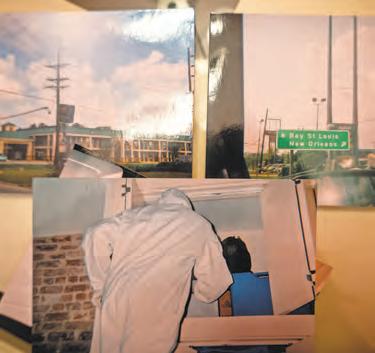
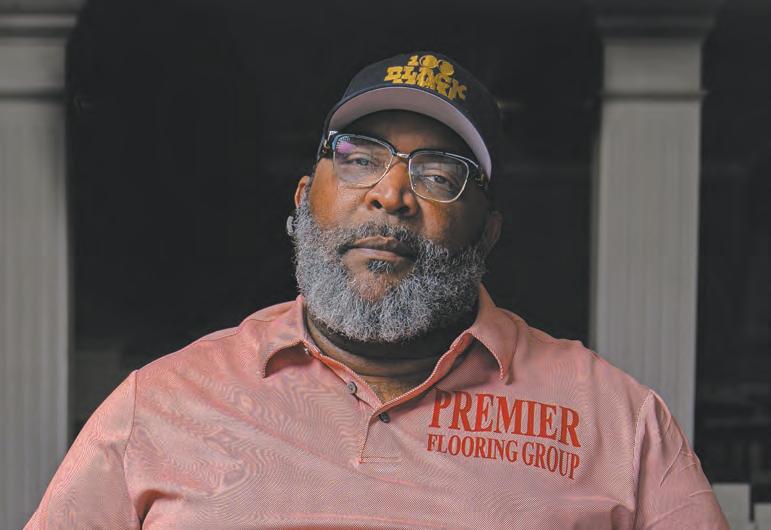
Katrina hit New Orleans on Monday, August 29, 2005, but on Friday, August 26, Kayla remembered, “We were outside playing in the street.”
The next day, the family evacuated. It wasn’t until days after Katrina hit that Kayla truly grasped what had happened. Dealing with Mississippi’s own destruction from Katrina, Kayla and her family didn’t have power to watch television to see what was going on back home.
“And then when the power came back on, after it being off for a couple days, we turn on the TV and New Orleans is underwater,” said Kayla. At 10 years old, she was too young to fully grasp how this event would forever change her childhood, but old enough to know it was serious.
Just two weeks into her last year of elementary school, Kayla and her family were uprooted over 400 miles across the south to Atlanta to stay with her cousin, a city she knew nothing about except that her cousin lived there.
Living with her aunt and uncle, who was an attorney in an affluent neighborhood in Gwinnett County, Kayla described it as a “culture shock” when she first attended school in Atlanta. She went from attending school in the 7th and 9th Wards of New Orleans, where she was among a class full of Black students, to being the only Black student in her suburban class in Atlanta.
“We had really young parents who weren’t really financially stable,” said Kayla. She recalled her family going to Goodwill to find clothes after all of them were lost in Katrina.
“And I remember it was like two pairs of shoes and maybe six or seven outfits that I would wear on rotation. So kids were kind of picking on me because of that.”
Kayla arrived in Atlanta in 2005 and never left. She finished high school at South Gwinnett High School, earned her degree from Georgia State, and, nearly 20 years later, still calls metro Atlanta home.
Her love for New Orleans is still there and comes out when she visits, but Kayla admits, “The city has just never been the same.”
the news on TV. Usually, when he and his family evacuated to Beaumont for hurricane warnings, it was only for a day or two, but this time felt different.
Moments later, the reporters on the news made a statement that left Dean and many others in the lobby in shock.
“We were watching the news, and they said, well, this is a direct hit. Make plans to stay wherever you are in the country. We’re not going to open the city back up for residents to come back home for 90 days,” said Dean, reflecting on the day in late August 2005.
“Our eyes and mouths were wide open. We were like, 90 days? What the hell we gonna do for 90 days?”
Dean, his family, and a couple of friends began brainstorming on a long-term place to stay. “It was between Dallas and Atlanta.”
So they embarked on an 18-hour trip to Atlanta. For Dean, he really didn’t expect the stay to be long. He thought in a couple of months, he would return to running his flooring business back home and go back to normal.
The Saints shirt Alicia Duncan wears with pride might throw you off at first. She grew up in Atlanta nearly her whole life. Atlanta is where she learned to drive, went to her high school prom, and performed in her first fifthgrade play. Atlanta is home.
But the life she knows now could have been completely different.
She was three years old when her parents and two older siblings fled New Orleans because of Katrina. Most of her memories from that time are hazy, but one moment stands out.
“I remember we were all gathered around this really small TV in Mississippi, watching the news coverage. I remember distinctly,” she said. “There was a newscaster on TV, and he was literally getting blown away by the winds.”
Over the next few days and weeks, she went with her family from New Orleans to Jackson, Mississippi, and then to Atlanta. She didn’t really understand the stress her parents and siblings were under.
“I was just a baby,” she said.
As Alicia got older, listening to her siblings and relatives share their anecdotes about Katrina brought a deep sadness. Watching archival news footage of New Orleans flooded and stripped of life, she said, “It’s really sickening and disheartening to see how America treated the city.”
Even now, at 23, when she hears her dad retell how he led their family of five through the evacuation, her face still shows shock and sadness. “I wish I kind of got the experience of childhood in New Orleans before Hurricane Katrina,” she said.
There are pieces of childhood Alicia never got, like being close to her cousins and relatives, many of whom were scattered across the country after Katrina.
Thomas Dean, Age: 35, Home: 9th Ward
Sitting in a Belmont Hilton lobby, where he and his family were staying to take shelter from Katrina, Thomas Dean thought to himself, “We going back home soon, right?” as he watched
His house sat in the Garden District of New Orleans, an area not usually prone to flooding. He even got word from his Uncle Cyril, who had stayed through the storm, that the house was fine immediately after Katrina.
“Bo, your house is good. I’m standing in front of your house. Your work van is not underwater,” said Uncle Cyril.
However, as the day passed, he received another call from his uncle.
“I heard an explosion,” Dean remembers his Uncle Cyril saying. “Man, something strange happened. Now they’re talking about levees breaking, the water’s rising. I got to get out of here.”
When Dean returned to New Orleans a few months after Katrina, much of what he knew was gone.
“So as you were driving down the street, reading these damn Xs on these houses, it was very telling,” said Dean.
Dean grew frustrated with the government’s lack of urgency in rebuilding the city.
“Bush was in office. They didn’t care about other Black folk. So I got mad.”
That anger eventually led him to decide to keep his family in Metro Atlanta. Dean admits his adjustment wasn’t as hard as it was for many others. A family in Stone Mountain allowed him and his family to live in a five-bedroom rental rent-free for a year while they saved up.
During that time, Dean and his wife saved enough to purchase a new home a little over a year after Katrina.
Nearly two decades later, Dean still lives in Metro Atlanta and is a successful business owner. He owns Premier Flooring Group, one of the very few Black-owned flooring companies in the area.
“I’ve been really fortunate to have some success in business,” he said.
Although New Orleans will always live in Dean’s heart, he admits that moving to Atlanta opened his eyes in ways he hadn’t experienced before.
“You know, I’ve met more millionaires in person since I’ve lived here than I ever had in my whole life,” Dean said.
By TABIUS MCCOy
Each year, thousands of entrepreneurs, investors, and philanthropists come together in Atlanta to create a unique synergy. The event, known globally as Invest Fest, has become a cultural hub for both emerging and established business owners.
This year, The Atlanta Voice learned the stories behind some of the unique businesses at Invest Fest 2025.
The Financial Rewire
The Financial Rewire is a learning-focused company that creates tools to teach children financial literacy. Founder Rome Jones came up with the concept after being deployed to Iraq in the early 2000s.
“Having to leave my pregnant wife to serve in the war, I knew I wanted to find a way to teach my child about financial literacy,” Jones said. “I wanted to teach him 100 financial words to help him avoid the mistakes I made.”
Jones and his wife, Tiffany, raised their child using flashcards with terms such as EBITDA, capital gain, and credit building. The idea did not become a business concept until nearly 20 years later, during the COVID-19 pandemic, when a friend encouraged Jones to expand it. Since then, Financial Rewire has been supported by middle schools across the Southeast.
“The idea is to help kids avoid being victims to things like getting an expensive car note because of a lack of financial understanding,” Jones said.
BlackBalled Golf
BlackBalled Golf is a unique golf apparel company blending golf wear with streetwear. The brand’s name nods to the word

“blackball,” which Merriam-Webster defines as “to exclude socially.”
Founders Matt Daniels and Jordan Griffin started the brand after noticing a lack of apparel that appealed to their style and representation in the golf world.
“We felt that we were not socially accepted in the golf space,” said Jabari Marshall, who
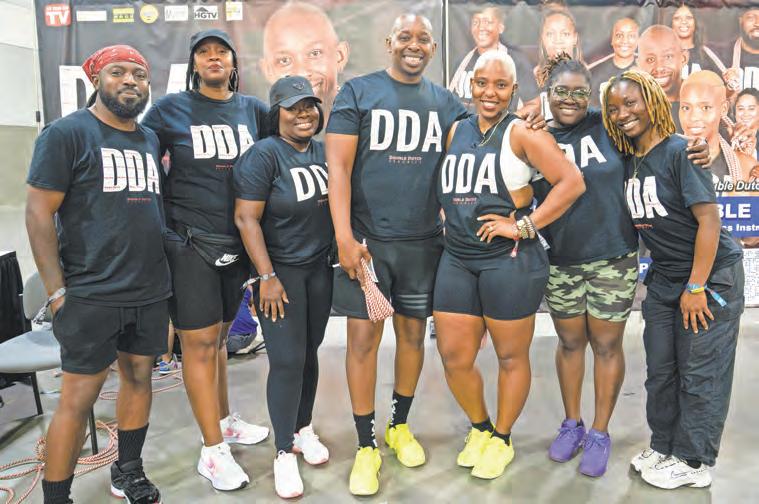
has served as head of marketing since the brand’s early days.
The inspiration also came from Daniels’ grandfather, William “Buddha Boy” Owens Jr., a pro-am golfer who often spoke about the discrimination he faced at country clubs.
BlackBalled Golf, the founders said, is their way of addressing the lack of inclusivity in golf.
The team includes five former Division I football athletes: Daniels, Griffin, Marshall, Johnny Williams as creative director, Barack Little as director of events, and Brandon Boykin.
Double Dutch Aerobics is a one-of-a-kind fitness studio based in Atlanta.
“We can teach anyone how to double dutch in less than a minute,” said co-owner Michelle Clark.
I tested the claim, and as someone who did not know how to double-dutch initially, I learned very quickly. Double Dutch Aerobics was started by husband-and-wife team Michelle and Sean Clark. The idea came about when Michelle, a world double-dutch champion, realized there was no fitness class that used the sport as a workout.
For 13 years, Double Dutch Aerobics has traveled the world teaching people—from movie actors to prison systems to local school programs—the sport of double dutch.

The Cuppabrew is a one-of-a-kind coffee bean distributor specializing in Jamaica Blue Mountain coffee. The company was founded by husband-and-wife team Travis and Danielle Pinnock, both born in Jamaica.
By NOAH WASHINGTON
The Home Depot Foundation launched a new pilot program this Thursday aimed at introducing young people to skilled trades careers, partnering with Boys & Girls Clubs of America to address a growing labor shortage in construction and related fields.
At the Warren Boys & Girls Club in Atlanta, dozens of volunteers worked with students during the program’s inaugural event. Middle and high school students built picnic tables, benches and Adirondack chairs for use around the club, while younger children in grades K-5 participated in a workshop to build piggy banks.
The initiative is part of a $10 million nationwide investment by The Home Depot Foundation to expand access to skilled trades training across Atlanta, Houston and Phoenix. The two-year pilot program aims to reach more than 1,000 youth.
“Less than 3% of young people and high schoolers consider a job in the skilled trades,” said Erin Izen, executive director of The Home Depot Foundation. “There are these misperceptions that it’s dirty, that they don’t make a lot of money, things that really aren’t true.”
Izen, who has been with The Home Depot for 21 years, said the foundation’s goal is to show young people there are alternatives to traditional four-year college paths.
“We have a lot of youth that don’t know that there’s other options besides four year degrees and different careers where you can
Continued from page 6
“Cuppabrew Coffee is not your run-of-themill coffee bean you would find at Starbucks or your chain coffee shop,” Travis said. “It is an experience. You might just drink our coffee once a week on a special occasion.”
The inspiration came when Travis visited Jamaica’s Blue Mountain region for his birthday. “We learned the ugly truth about the coffee industry in Jamaica,” he said. Many coffee farmers, he discovered, were shortchanged by large distributors and were not paid livable wages.
Travis and Danielle decided to change that, partnering with farmers and paying fair wages. Travis’s environmental science background and Danielle’s technology background helped make Cuppabrew a forward-thinking, sustainable business.
“We started a business that ties back to supporting farmers in our homeland,” Danielle said.
Wimee and Wimage
Michael Hyacinthe, a Navy veteran and former combat engineer, wanted to create

get dirty and use your hands,” she said. “For us, it’s important that we have youth like you have here at the Boys and Girls Club know that there are these wealth building careers and other options outside of just going to college.”
The program addresses a critical workforce shortage. The United States currently has about 400,000 open jobs requiring skilled plumbers, carpenters, electricians and HVAC specialists. That number is projected to reach 3.9 million in the next decade, according to foundation officials.
“The United States has a big problem where we have a growing skilled labor gap,” Izen
something positive after leaving the military. In 2016, he launched the Wimage app, which later led to the creation of Wimee, a colorful robot built from recycled parts to show kids that imagination can turn anything into something new.
“Wimee teaches kids to dream big,” Hyacinthe said. “If they can see me, a person of color and a veteran, create a character that ends up on TV, they will know they can do it too.”
What started as workshops during ArtPrize Education Days grew into programs in every preschool and Head Start classroom in Kent County. When schools went virtual, the team launched Wimee’s Words, a PBS show co-produced with Kent District Library. The brand has since expanded into books, toys, and lessons covering social-emotional skills, colors, vehicles, and even money basics.
“Our goal is to be the next Sesame Street for the digital age,” Hyacinthe said.
Inspiring and Empowering Ladies
Dominique M. Williams is the owner of Inspiring and Empowering Ladies, a book publishing company that focuses on self-help books for Black girls and women, encouraging
said. “It’s 400,000 open jobs today, projected to be 3.9 million in the next 10 years, and that’s got a big impact on our economy.”
Marlon Montgomery, vice president of youth development for Boys & Girls Clubs of Metro Atlanta, said the partnership focuses on exposing young people to career opportunities they might not otherwise consider.
“Our programs are centered around exposure opportunities,” said Montgomery, who has been with the organization for just over two years. “We say that we ignite unlimited potential in kids and teens by providing these types of opportunities.”
Montgomery emphasized the importance of hands-on learning in changing perceptions about skilled trades careers.
“Sometimes our kids aren’t thinking about this opportunity, and so today’s really about exposing our kids and teens to the potential, looking ahead in their future, building bright futures through hands-on learning,” he said.
The Atlanta native expressed enthusiasm about the program’s potential impact: “I hope they have fun. I hope their brains and minds are opened up to an opportunity with skills trade, and hey, I hope they become fans of Home Depot, because we certainly are.”
Rob Armstrong, director of life and workforce readiness at Boys & Girls Clubs of America, brought a decade of workforce development experience to the partnership. The San Diego native, who moved to Atlanta in 2021, said the program addresses a critical need in communities.
“Previous to Boys and Girls Club of America,

I worked in workforce development for roughly about 10 years, and getting into this work really dives deeper into the need of what is needed in our community,” Armstrong said.
“Being able to get young people the exposure that they need or that they want to have different careers in different sectors.”
The initiative builds on The Home Depot Foundation’s existing Path to Pro program, which has operated since 2018 with a $50 million commitment to skilled trades training. Since its launch, the program has introduced more than 490,000 people to skilled trades professions and trained more than 60,000 participants, including youth, high school students and military veterans.
“So far, we’ve introduced over half a million people, and we have trained over 60,000 people in the skilled trades, and we don’t see it stopping anytime soon,” Izen said.
Thursday’s event marked the beginning of regular programming that will continue throughout the two-year partnership. The program is designed with age-appropriate activities, with elementary students focusing on basic building skills through projects like the piggy banks, while middle and high school students tackle more complex carpentry and construction tasks.
The Warren Club serves hundreds of children and teens annually, providing programming during after-school hours. The Home Depot Foundation has committed to investing $750 million in veteran causes by 2030 and continues its focus on disaster relief and skilled trades education.
them to walk confidently in their purpose. Williams became inspired to start her journey as an author when her daughter was born.
“When I got pregnant with her, I decided to pick up my passion for writing,” she said. “I wanted to show her what it was like to go after your dreams.”

By DONNELL SUGGS
The Atlanta Braves will close out a long road trip in Chicago next week. The Braves have been away from Truist Park for the past seven days, having played a three-game series in Miami against the Marlins, and a four-game series in Philadelphia against the first place National League East Phillies.
On Monday, Sept. 1, the Chicago Cubs will host the Braves for a three-game series. The two teams will meet again the following week when the Cubs will be in Atlanta for a three-game series beginning on Sept. 8.
The Braves have not played well on the road this season. Currently more than 10 games under .500 on the road, but Atlanta finished their latest homestand - a series loss to the New York Mets- with a 33-33 record at Truist Park. With 15 more home games remaining in the season,

there is a chance the Braves can finish the 2025 season above the .500 mark at home. This is something the franchise has done frequently for the past three decades, including the 1995 World Series championship season, which was honored during last Friday’s game against the Mets.
A nine-game homestand featuring the Seattle Mariners (Sept. 5-7), Cubs (Sept. 8-10), and the Houston Astros (Sept. 12-14) will be up next. All
three opponents are in the hunt for postseason spots, so the Braves will have an opportunity to play spoiler in the American League where Houston and Seattle are currently in first and second place in the American League West. The Cubs and former Braves shortstop Dansby Swanson are behind the first Milwaukee Brewers as of this Friday.
As of last week, Braves right-hander Hurston Waldrep was giving the Braves front office and fan base something to look forward to for next season. Through four starts this season, Waldrep has displayed the poise of a veteran.
On Tuesday, in Miami against the Marlins, he had what can be considered his worst start of the season. In 5.1 innings, Waldrep gave up an earned run and eight hits without striking out a Marlins batter. He left the game with the Braves ahead 2-1 with one out. Miami would tie the game an inning
later, and Waldrep would not earn his fifth victory of the season. Atlanta would score nine runs in the ninth inning to win the game 11-2.
Major League Baseball released the 2026 schedules on Tuesday. The Braves will open the season at Truist Park instead of with seven straight games on the West Coast, like they did this season.
The Kansas City Royals and the (Sacramento/ Las Vegas?) A’s will be the first two opponents of the 2026 season. Atlanta will then travel out west to play four games in Arizona, followed by three in Los Angeles against the Angels. Here’s to hoping former Braves coach Ron Washington will be in the dugout when they arrive.
Washington is recovering from triple bypass surgery. He took over as Angels manager following the Braves’ World Series championship victory over the Houston Astros in 2021.
By LAURA NWOGU
New Orleans native Donald Williams Jr. is adamant about bringing a taste of The Big Easy to Atlanta. Williams owns D’Juans New Orleans Bistro in Smyrna, and the restaurateur is slated to open Blake’s Oyster Bar in September at 510 Fairburn Rd SW, Suite 200.
The seafood and Creole restaurant transports guests to the swamps of New Orleans. Upon entering the space, guests are welcomed with a big oak tree sprouting from the bar area, alligator heads holding up light fixtures within their jaws, and vertical sliding windows bringing in rays of sunshine leading to patio seating. From the menu to the restaurant design, Williams wants to create family through food.
The Atlanta Voice: Why was now the perfect time for you to open up a sister restaurant to D’Juans New Orleans Bistro?
Donald Williams Jr.: “It’s needed in this area. Everyone loves D’Juans, but we need something on the south side. They need something like an upscale restaurant, because most people overlook and ignore this area.”
AV: What made you fall in love with the restaurant industry?
DW: “The people make you fall in love. There are different people with different personalities and different experiences. You have some that just come, and I’ll be a counselor, talking to them, giving them advice. But there’s also the joy that people drive over an hour or something to be there. It’s just the fellowship, mainly.”
AV: Can you tell me a bit about the name, Blake’s Oyster Bar? I know it’s named after a special 10-year-old boy.
DW: “Yes, it’s named after my godson, Blake. He’s amazing, so I wanted to give him something and start him at a young age of entrepreneurship.”
AV: And when curating the menu, what can people expect that’s different from D’Juans?
DW: “Blake’s is more seafood. We’re going to elevate with pastas. We’re going to elevate with more different types of po-boys. We’re going to bring more of the alligators here. We’re going to step it up to give them the swamp feel. We’re going to have more crab claw fingers. Blake’s is a more authentic, swampy-feeling type of restaurant.”
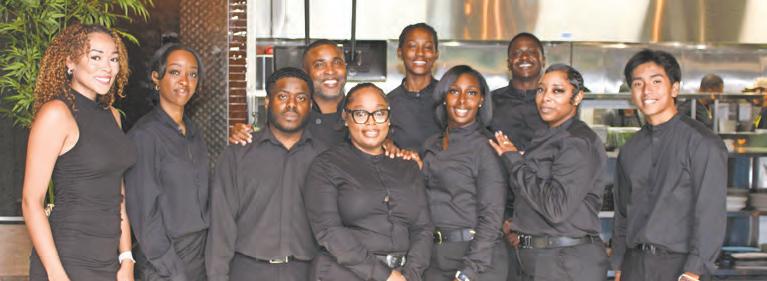

AV: As a New Orleans native, what does it take to bring a taste of New Orleans to Atlanta?
DW: “One, patience. One, understanding. One, knowledge of the culture. But what it really takes is passion and love. And you have to love your city, and you have to want to bring it here and make them really feel it. At every turn, you have to make it feel like they’re stepping inside [New Orleans].”
AV: What makes New Orleans cuisine so special?
DW: “Seasoning.”
AV: What are you most excited for people to experience when they come to Blake’s Oyster Bar?
DW: “Good food, customer service, and to feel that they are a family, they’re seen, and they’re not a number.
AV: D’Juans is relocating to a new location in Smyrna, and then you also have Blake’s
opening. How does it feel for you to be able to expand the brand this much because the community has responded so well to what you’ve been able to build here?
DW: “It’s a feeling that is so real. I’m more emotional. I don’t want to say sad, but I always want to cry because it’s unbelievable. I started D’Juans two years ago, and I’m actually expanding it to a bigger location, and I’m opening up a sister restaurant. With that, I feel so blessed that God has favored me.
I look forward to coming to them, and if there’s anything they feel we’re missing here, I’m all ears to talk. I want them to feel welcome. I want them to feel like they’re part of the family.
AV: When Blake opens, what do you hope it adds to the Atlanta food scene?
DW: “I hope it adds a place that people can call home.”
By DONNELL SUGGS
During a week in which both Georgia Senators Raphael Warnock and Jon Ossoff addressed the media about the toll tariffs are taking on small businesses in Georgia and healthcare cuts are having on Georgians, United States Vice President J.D. Vance returned to the Peach State to talk about the tax cuts within President Donald Trump’s “Big Beautiful Bill.”
The Vice President also took verbal jabs at the City of Atlanta and Georgia Senator Jon Ossoff while he was in Fayette County.
“I haven’t been to Atlanta in a little while, but I bet there are places in Atlanta you wouldn’t take your family,” Vance, a native of Middletown, Ohio, said.
That comment was followed by a large round of applause. Peachtree City is 30 miles from Atlanta. He wasn’t done. He mentioned crime in Atlanta at least a half-dozen times during his speech.
“People that built Atlanta did not build it so you could not walk the streets safely at night,” Vance said.
On Ossoff, who is currently campaigning for a second term to represent the state of Georgia in the United States Senate, Vance said he wasn’t doing a good job in Washington and needs to be replaced in next year’s election.
“I see the future of the state of Georgia,” Vance said.
Black SUVs with tinted windows and the workers at Alta Refrigeration, Inc. on forklifts crosscrossed the large parking lot hours before Vance

arrived. Alta Refrigeration, an industrial equipment supplier, employs hundreds of people who live in Fayette County, a Republican stronghold for decades.
The image of the SUVs being driven by men and women in dark suits and sunglasses and the forklifts being driven by men in Dickies overalls with t-shirts underneath and work boots on blended what the Republican Party has been preaching ever since Trump became the face of the party: We are all on the same page.
An hour before Vance took the stage, Alta employees lined up on stage under a navy blue banner that read, “JOBS! JOBS!, JOBS!, JOBS!”
The entire event was an opportunity for republican politicians to champion Trump’s bill, while propping up Republican candidates for governor and Senate in this state.
The tax cuts Vance came to Georgia to talk about are being used in opposite ways depending on what political parties deliver the message.
Senatorial candidates Derek Dooley and Buddy
Carter both took shots at Ossoff during their time on stage.
“He is a typical politician. He looks good, he talks good, but we have an old saying in football: “Your film is your resume,” said Dooley, 57, who opened his remarks by saying he is new to politics and that was why he was selected to speak first.
“Jon Ossoff doesn’t represent the values of Georgians,” Carter said. “He does not work for you. I’m running for United States Senate and I’m working my ass off to get rid of Ossoff.
Georgia Congressman Mike Collins and Lt. Governor Burt Jones also took the stage to make comments about the ‘Big Beautiful Bill” and the 2026 Senate election.
Collins also attacked Ossoff during his speech, calling Ossoff a “trust fun kid” and saying that he doesn’t believe in the state of Georgia.
“He is California’s third senator,” Collins said. “Come November, we are going to fire Jon Ossoff.”
Alta Refrigeration President Eric Brown introduced Georgia Congressman Brian Jack.
“This is a monumental moment for Alta Refrigeration,” Brown said. “In my book, guys, this man is a rock star.”
Jack said it was an honor to welcome Vance to his hometown in Fayette County and credited Trump for “delivering on his promises.”
Mayors from Peachtree City, Tyrone, Woolsey, local politicians, city council members, and former Georgia Senator Kelly Loeffler, United States Administrator of the Small Business Administration were also in attendance on Thursday.
By DONNELL SUGGS
What was being labeled as a
“meet & greet” took place inside the New Beginnings Center on the campus of First Baptist Church. The Georgia branch of the NAACP hosted the event on Wednesday night. The room, which looked more like a gymnasium, was quickly full of active voters, interested locals, and a good example of the voting demographics in Houston County. Black men and women of all ages mixed and mingled with white men and women.
Houston County is the 14th largest county in the state, according to the United States Census. But if anyone is going to win the election, they will need support from medium-sized counties like Houston to do it.
The flyer for the event displayed the headshots of all eight candidates for the state’s highest office. Only five of them were sitting on the stage when the event started at 6 p.m.
Jason Esteves arrived first and could be seen working the room, shaking hands with people and taking selfies with others. A state representative in a land far, far away from Warner Robins, Esteves had already hit the ground running, campaigning in Coastal Georgia weeks before the event in Houston County.

chaos that’s going on in Washington, D.C.,” Esteves said.
He was referring to the Trump administration, but there is also chaos on the streets of D.C. because of the federal police presence brought on by the President.
The line of the night was delivered by State Representative Derrick Jackson, who said if you ever wondered what it was like to fight for civil rights, you now have your opportunity under the Trump administration. Many in the room applauded the retired United States Navy veteran following that comment.
Former Georgia Labor Commissioner and DeKalb County CEO Michael Thurmond was second to last to speak, but might have made the most impact on Wednesday night.
“Roll it,” said Thurmond as his campaign video played in the background.
court and serve on Wednesday night.
Thurmond asked the teachers, cooks, and bus drivers in the room to stand up and receive applause. He said those were the people who needed to be put first by politicians.
“White collar, blue collar, no collar. It’s not the collar, but the green in the dollar,” Thurmond said.
Thurmond was loudly applauded several times during his speech.
“Work is dignity. Honest work. Honest pay,” he said.
Yasger, 36, was the only white man on stage. That helped him stand out, but so did his personal story. Yasger said he wants to give people a reason to be proud again, “no matter who’s in the White House,” he said.
During his speech, Esteves made sure to let the crowd know that he was a middle school teacher and appreciated the service educators provide.
“By the way, that job is still the toughest job I have ever had,” Esteves said.
Esteves called out fellow candidates Burt Jones and Chris Carr, and former Georgia Lt. Governor Geoff Duncan, saying they are politicians who cared more about party politics than people.
“As governor, I will make sure I stand up to the
Thurmond and retired 14-year United States Marine and Republican candidate Ken Yasger were the only candidates to give their speeches from the floor and not behind the podium.
It has been 26 years since a Democratic candidate was elected Governor in Georgia. The majority of the men in that room tonight are vying to become the next one to walk the halls of the Governor’s Mansion. Thurmond, the only man in the room to win multiple statewide elections, held
Yasger admitted that he suffered from alcohol abuse and is currently a year and a half sober. He said he nearly ended his campaign two weeks ago because of a lack of media attention and fundraising. Yasger acknowledged he has raised $8,000 so far and has donated $5,000 of it to local charities.
“That American flag will outlive all of these politicians,” Yasger said.
Georgia Attorney General Chris Car, former Atlanta Mayor Keisha Lance Bottoms, and Georgia Lt. Governor Burt Jones were not in attendance, but sent videos in their stead.
By ISAIAH SINGLETON
Abel Tesfaye, better professionally known as The Weeknd, brought his sold out “After Hours Til Dawn” tour to Atlanta and shut down Mercedes-Benz Stadium.
The heavy thunderstorms on Thursday night didn’t stop the massive fans from enjoying The Weeknd’s electric catalogue.
This marks the first time in three years he’s played in Atlanta. In 2022, the opening leg of the same tour visited Atlanta. Additionally, The Weeknd’s After Hours Til Dawn Tour is also now the highest-grossing R&B tour of all time, grossing $635.5 million and selling 5.1 million tickets since launching in 2022.
“It’s been too long, Atlanta. I really can’t believe it’s been three whole years. I’ve really missed y’all,” The Weeknd said.
Opening with “The Abyss” and wearing his iconic gilded mask, fans all over the stadium shouted the lyrics back to the star. The R&B singer followed up with “Wake Me Up” and “After Hours” before belting out “Starboy” to the sold-out Atlanta crowd.
While the crowd belted and screamed “Abel” during a brief pause, 20 songs into the more than 40-song set, The Weeknd brought out Playboi Carti for “Timeless”, who was also one of the openers on the tour.

bel Tesfaye, better professionally known as The Weeknd, brought his sold-out “After Hours Til Dawn” tour to Atlanta and shut down Mercedes-Benz Stadium. Photo by Isaiah Singleton/The Atlanta Voice
From the very start of the show, you felt like you were watching a film with all the effects, dancers, lights, and of cours,e The
Weeknd’s silky vocals. From the perspective of someone who has never been to a Weeknd show, I was truly blown away by the level of
By DONNELL SUGGS
National Association of Black Journalists (NABJ) founding member Sandra Dawson Long Weaver was emotional as she sat on stage and retold a story from the most recent NABJ Convention in Cleveland. ESPN television personality Stephen A. Smith had seen her following a taping of “First Take” and ran over to hug her. Weaver said he held on tight while thanking her for giving him an opportunity to be a sports writer at the Philadelphia Inquirer some 30 years ago. Weaver hired Smith because she believed he had something special in him that would help him succeed in journalism; she was right.
“I still get emotional thinking about that,” she said.
Weaver and fellow founder Allison Davis received their flowers on the stage inside the Tara Theater on Friday night following a screening of the NABJ documentary Beyond the Headlines: The NABJ Journey. Both women, journalists in their own right during their careers in television production and at newspapers, were
prominently featured during the film. “Beyond the Headlines,” which shines a light on the 50year existence of NABJ, was screened as part of the annual BronzeLens Film Festival.
Both Davis and Weaver joined NABJ as 20-year-olds and had no idea they would still be talking about the organization five decades later. Each woman said there is a need now more than ever for a film about an organization such as NABJ.
“We wanted to make sure, not only to commemorate NABJ, we felt it was important that we share our story,” said Davis, who was one of the film’s producers. “We feel the film does that.”
Along with Atlanta, there are other cities where screenings of “Beyond the Headlines” is being screened, including in Cleveland during the annual NABJ convention earlier this month.
“It’s important because this film will reach a wider audience, not just only our NABJ convention audience,” Weaver said.
Having the idea of a NABJ documentary become an actual documentary was a process worthy of discussion. Davis and Weaver took
artistry and energy he brought to the stage. I love the musi,c but hearing it live was like entering a new world, or in this case, I was in the world of “After Hours Til Dawn”, and it truly showed. You could see in his eyes how taken aback he was staring out into the crowd hearing his lyrics being screamed to the rooftops.
Following “Rather Lie” with Playboi Carti, The Weeknd played “Low Life,” a cover song by the artist Future, who joined him on stage to perform the song. The crowd went wild to see the Atlanta rapper appear on stage. The show overall was a true experience that not only showcased The Weeknd’s vast fanbase and lovers of his music, but also how much he prides himself in his love for what he does.
Some of my favorites performed were “Timeless”, “Save Your Tears”, “Call Out My Name”, “Blinding Lights”, “Can’t Feel My Face”, and so many more.
Before the show was all done, The Weeknd delivered more than 40 songs on stage, giving fans and everyone alike a vibe and experience they would never forget. With rumors hinting at The Weeknd dropping his stage name after this tour moving forward, this was such an amazing way to highlight his journey as The Weeknd.
questions from longtime NABJ member and Atlanta Journal-Constitution Editor-in-Chief Leroy Chapman following the conclusion of the screening. During the Q&A portion of the night, both founding members were open and honest about how they made it into the room on that faithful day in Washington, D.C. There are also moments in the film where other founding members spoke about how they found their way to D.C. from all over the country.
“It is Black history,” Weaver said of the film. “That is one of the reasons we wanted to start this organization. Now it has over 4,000 members.”
“Our job is to not only tell our stories, but to make sure our young people know our stories,” Davis said during an interview with The Atlanta Voice before the screening.
When asked if either founder believes watching “Beyond the Headlines” should be a required viewing for NABJ members, Weaver said it should.
“I think it is critical that when you come into this organization and see this film,” she said. Davis agreed.
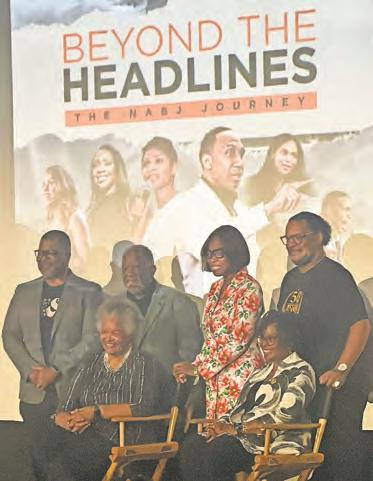
“I absolutely think all members should see it,” she said. “We do that with our sororities and fraternities, why not with NABJ?” she reasoned. “This film is a way of saying we’re not letting our stories disappear.”
SPONSORED BY JPMORGANCHASE
At the beginning of a JPMorganChase-sponsored panel during the 2025 National Association of Black Journalists (NABJ) convention, Washington Post personal finance columnist Michelle Singletary asked participants to raise their hands if they’d ever received a suspicious text message about a job offer.About half the room lifted their hands. Then she kept going.
“If you’ve gotten one of those ‘you owe a toll’ texts but you don’t even have a car? What about crypto? What if you’ve gotten something from Zelle from your bank and you don’t even have a bank? What about a bill? A package coming from Federal Express?”
By the time she finished the list, every hand was in the air.
On Aug. 7, Singletary joined other experts from the financial and security sectors for the NABJ luncheon panel discussion, Safeguarding Consumers Against Fraud and Scams in the Digital Age, in Cleveland, Ohio. The panel was organized to help educate journalists from across the U.S. about the evolving landscape of fraud and scams so they can in turn raise awareness among their viewers, listeners and readers.
In 2024, the U.S. Federal Trade Commission received complaints totaling $12.5 billion lost to scams or fraud. Globally, $485.6 billion was lost to scams or fraud, according to Nasdaq. A Bankrate.com study also reported that one in three Americans faced a scam during the last 12 months, and an FBI cybercrime report recorded $16 billion lost to fraud or scams in 2024.
“This issue impacts all of us, whether you’ve been directly scammed or you know someone who has,” Singletary said. “This is the financial pandemic we’re dealing with today.”
Fraud vs. scam: What’s the difference?
Both frauds and scams are “terribly invasive,” said Diedra Porché, national head of community and business development at JPMorganChase. “You’ve lost money in some form or fashion.”
Even though both involve invasions of security and privacy, fraud and scams have some key differences. With fraud, someone illegally accesses your information or your account to move your money around. Scams take place when someone has duped, tricked or manipulated you into providing personal information so they can gain access to your funds.Another key identifier of a scam is impersonation, noted Sheryl Harris, director of the Cuyahoga County (Ohio) Department of Consumer Affairs. A scammer will often pretend to be a representative of a bank, government agency, law enforcement unit or other outside party when they contact

you by phone, text or email. They might tell you something bad is happening with your account or to a loved one and try to scare or coerce you into quickly giving them money to fix the “problem” or help your loved one. Once you’ve given them your funds, they’ll disappear – and you’ll learn there was never an issue at all.
Toni Pietrocola, president of AI cybersecurity company AgileBlue in Cleveland, warned attendees about the growth of AI scams as well. Scammers/fraudsters can gather information from social media profiles, including voices, and create a voice call, email or text from a loved one, boss or other associate asking for financial or other personal information. The information gleaned from social media might make the request feel more real, even though it too is a scam.
Ways to stay safe
Porché also emphasized how people of all ages can be victimized. Younger people might be targeted by scammers claiming to offer a job and asking for financial information to pay for a background check or work attire. Scammers might also reach out to college students at the beginning of the year offering discounts on books if they send money
to a certain account.
“Just be aware new scams are happening all the time, so always verify the source and reach out to someone trusted to make sure it’s valid,” Porché said.
Other tips from panelists included using two-factor identification to log into financial accounts, avoiding public WiFi where outsiders can access your account or other personal information and being careful about the information you share on social media.
If you have questions about a call or text supposedly from your bank, call the bank directly using the number on the back of your debit or credit card, not the number on the text message, they said. Contact a law enforcement agency if you get a message or call about a loved one supposedly needing money to get out of jail or another dire situation.
Free guidance can be found on the FTC website, and many financial institutions, including JPMorganChase, provide free information online and in branches about protecting yourself from scams. All are welcome to pick up information or attend a workshop, even if they don’t have a Chase account.“We’re keenly focused on raising awareness to prevent scams and fraud, which is why we’re hosting workshops with
partners across the industry, such as journalists, law enforcement, and government,” Porché said. “This issue is real, and it’s affecting everyone.”
For informational/educational purposes only: Views and strategies described on this article or provided via links may not be appropriate for everyone and are not intended as specific advice/recommendation for any business. Information has been obtained from sources believed to be reliable, but JPMorgan Chase & Co. or its affiliates and/or subsidiaries do not warrant its completeness or accuracy. The material is not intended to provide legal, tax, or financial advice or to indicate the availability or suitability of any JPMorgan Chase Bank, N.A. product or service. You should carefully consider your needs and objectives before making any decisions and consult the appropriate professional(s). Outlooks and past performance are not guarantees of future results. JPMorgan Chase & Co. and its affiliates are not responsible for, and do not provide or endorse third party products, services, or other content.
Deposit products provided JPMorgan Chase Bank, N.A. Member FDIC. Equal Opportunity Lender.
© 2025 JPMorgan Chase & Co.



Sealed Bids for 25ITB1412133B-AA W-2, and Affordable Care Act Filing, Processing, Printing & Mailing
Services for the Department Information Technology, will be received via Bidnet Direct at www. Bidnetdirect.com. All Bids must be received no later than Thursday, September 25, 2025, at 11:00 A.M. local (Eastern) time on thestated due date. Bidder(s) names will be publicly read at 11:05 A.M. local (Eastern) time, via Zoom.
Fulton County, Georgia “County” To provide a system, to process, print, fold, and mail W-2 forms, 1099-Misc forms, 1099-R forms and Affordable Care Act (ACA) forms for employees, poll workers, retirees and vendors of Fulton County.
The detailed scope of work and technical specifications are outlined in the Scope of Work of this bid document.
Fee: N/A
Term of Contract: This is an annual agreement with three (3) one (1) year renewal options. A Pre-Bid Conference:A Pre-Bid Conference will be held via Zoom. Date: Thursday, September 04, 2025 Time: 11:30 AM local time Zoom Link: https://zoom.us/j/93258738199?pwd=oF6CBLpab0nOlHmL54nvSmMC6kKXhe.1
If you have any questions regarding this project please contact Alma Alphonse, Assistant Purchasing Agent at (404) 612-4208 or by email at alma.alphonse@fultoncountyga.gov.
Fulton County reserves the right to accept or reject any or all bids and to waive technicalities.

FULTON COUNTY ADVERTISEMENT FOR BIDS
Bid Solicitation for 25ITB1421243A-ST Standby Utility Payment Patching & Pavement Services for Department of Public Works, will be accepted online through BidNet Direct on Tuesday, September 23, 2025. All Bids submitted must be received no later than 11:00 a.m. local (Eastern) time on the stated date. https://www.bidnetdirect.com/georgia/fultoncounty
SCOPE OF WORK: Fulton County, Georgia (“County”) The work will consist of providing all labor, equipment, and materials necessary for the construction, installation, and emergency repair of streets, sidewalks, curb and gutter, and other pavement but not limited to these items, within Fulton County. The work also includes providing an emergency paving repair crew on an as needed basis as requested. All work shall be in conformance with the contract documents, drawings, Fulton County, GDOT, Cities, Standards and Specifications as applicable for the location. Being this is a miscellaneous standby contract; the location of the work will be in various locations throughout Fulton County. Projects will be assigned by issuance of a Notice to Proceed for each individual project.
The detailed scope of work and technical specifications is outlined in the Division of Work Section, Summary of Work of the bid document.
In order to obtain complete information about this solicitation, please click the link below where this document and supporting documents can be downloaded, https://www.bidnetdirect.com/georgia/fultoncounty
FEE: N/A
BID BOND: N/A
CONTRACT TERM: 1 Year with (2) One-Year Renewal Options. PRE-BID CONFERENCE: will be held virtually online via a Zoom Conference on Tuesday, September 09, 2025 at 10:00 A.M. to provide bidder(s) with information regarding this project and to address any questions. Join Zoom Link: https://zoom.us/j/94247018612?pwd=ecfnTvCQ2ASBAEgnPTS3y7fyK8NTh0.1
Meeting ID: 942 4701 8612 Passcode: 398125
If you have any questions regarding this project please contact Shondra Turner, APA, (404) 612- 1100 or Email:shondra.turner@fultoncountyga.gov.
Fulton County reserves the right to accept or reject any and all applications and to waive technicalities.
